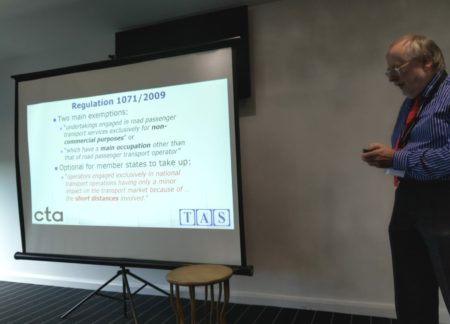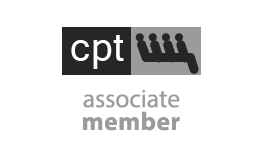
TAS warns CT sector against trap of Short Distance Exemption
 TAS Partnership director, John Taylor, has urged community transport operators against pursuing the Short Distance Exemption from ‘O’ licensing (introduced from 1 October 2019) – warning them that to do so before the forthcoming Judicial Review concludes would be to fall into a trap.
TAS Partnership director, John Taylor, has urged community transport operators against pursuing the Short Distance Exemption from ‘O’ licensing (introduced from 1 October 2019) – warning them that to do so before the forthcoming Judicial Review concludes would be to fall into a trap.
Speaking at the CTA UK’s CT’19 event in Manchester on Wednesday (13 November), John said: “The simple message is: don’t go there!”
The ‘short distance’ exemption would over-ride the current arguments about whether section 19 and 22 permits are being used for ‘non-commercial purposes’ but would only cover:
• services operating within a radius of ten miles from pre-determined central points; and/or
• services where the first point at which passengers can get on is no more than ten miles measured in a straight line from the last point at which they can get off
The regulations would allow some occasional services to go beyond that limit, and operators can apply to extend the 10 mile threshold in extenuating circumstances, primarily in rural areas. As John pointed out – “what constitutes a short distance differs enormously between central London and the Isle of Skye”.
The new regulations require permit operators to ensure that they are an “exempt body” under EU Regulation 1071/2009. There are three routes to exemption:
• that transport is not the main occupation of the operator; OR
• that they are operating exclusively for non-commercial purposes; OR
• that their operations all fall within the ‘short distance’ criteria.
However, John advised operators against opting for the ‘short distance’ exemption: “Operators should not abandon the idea that they are operating for non-commercial purposes. My guidance is that if any changes are required, operators should identify how they can continue to meet the non-commercial purposes exemption.”
This advice comes in advance of the Judicial Review claim brought by the BCA against the Secretary of State for Transport, due in the High Court on 19/20 November. The claim seeks to mandate DVSA to escalate enforcement action to prosecution CT operators running services under contestable contracts, because such contract work should not be considered ‘non-commercial’. Regardless of the outcome, the Department for Transport has promised a review of the Permit system next year, including the role of ‘designated bodies’ that can issue permits.
The TAS Partnership has been assisting CT operators to make strategic changes to their business models to reduce the current uncertainty they face. TAS has now developed a package of support and guidance for community transport operators faced with these very difficult challenges.
For more information or guidance about any of these issues, please contact John Taylor on 01772 204988 or email John Taylor


